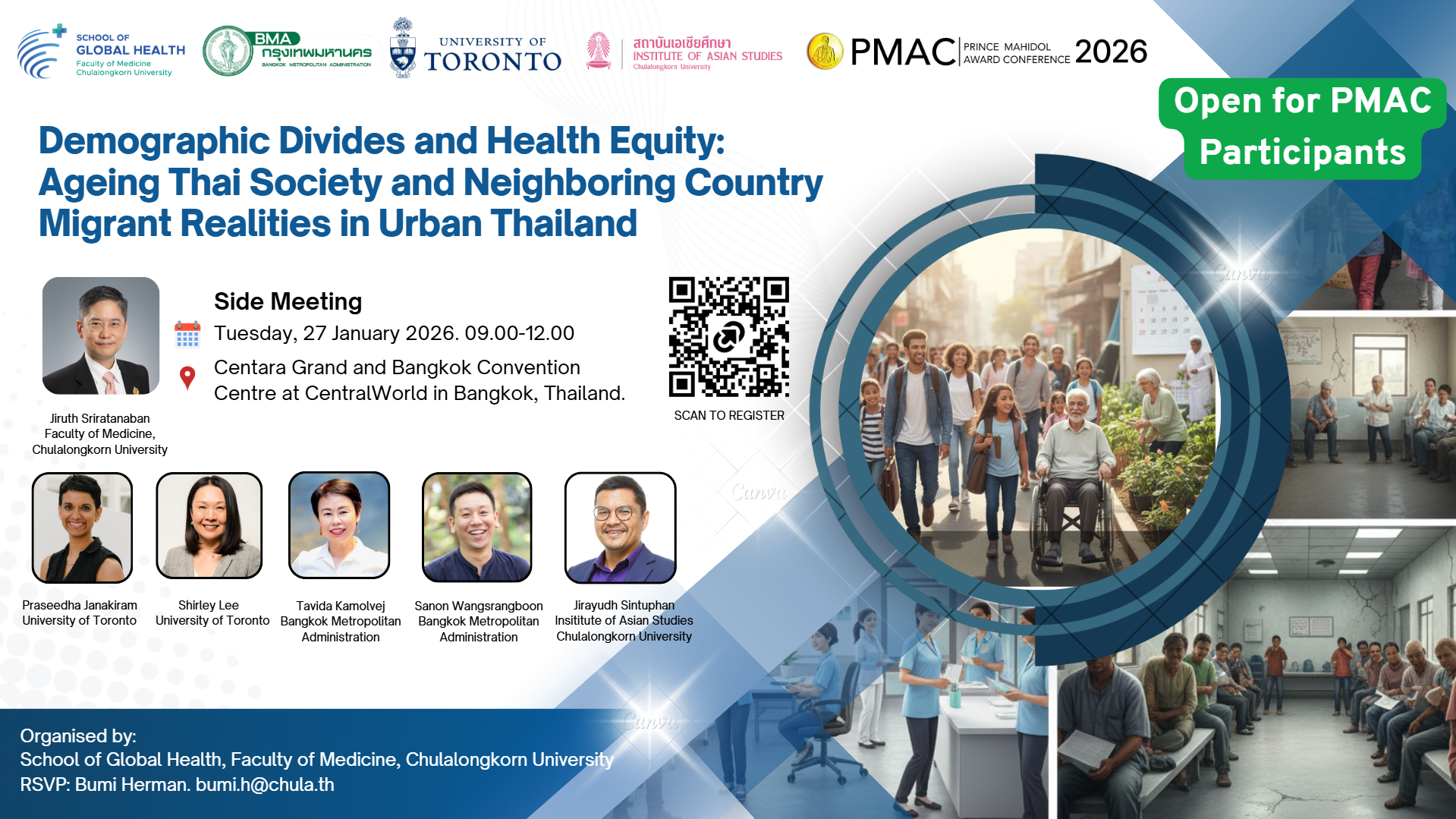Side Meetings
SMB111
Demographic Divides and Health Equity: Ageing Thai Society and Neighboring Country Migrant Realities in Urban Thailand
27
Jan
- School of Global Health, Faculty of Medicine, Chulalongkorn University
- Global Health Focus (GHF)

Thailand is undergoing a rapid demographic transition into an ageing society, with rising demand for chronic disease management, long-term care, and sustainable health financing. In urban areas such as Bangkok, this ageing trend intersects with another demographic reality: the influx of younger migrants from nearby countries who form a vital part of the city’s workforce, particularly in construction, services, and caregiving sectors.
While elderly Thais require substantial and sustained health and social care, younger migrant communities and their dependents face significant barriers to healthcare access, including language challenges, limited health literacy, unclear legal entitlements, and financial hardship. This dual demographic reality generates urban health inequities, where the elderly are at risk of insufficient care, and migrants remain vulnerable to outbreaks, interruptions in chronic disease management, occupational hazards, and limited social protection.
A potential pathway forward is to strengthen elderly care while engaging migrants as both contributors to and beneficiaries of the health system. By embedding community medicine approaches, adopting the WHO social prescribing model, and fostering intersectoral and regional collaboration, health systems can become more equitable, resilient, and navigable for diverse urban populations.
In this context, community medicine plays a pivotal role in bridging gaps between urban health systems and diverse populations. In Bangkok and other Thai cities, community-based approaches can help address both the needs of ageing Thai citizens and younger migrant workers by:
• Strengthening outreach and primary care tailored to urban demographic realities, including elderly services, occupational health, and maternal-child health for migrants.
• Training health workers in cross-cultural and multilingual contexts to ensure services are responsive and inclusive.
• Establishing trust within migrant and elderly communities so that services are acceptable, accessible, and effectively used.
At the same time, urban health systems must be more navigable, particularly for migrants who face barriers such as language, limited health literacy, financial hardship, and unclear legal entitlements. This requires simplified service pathways, the integration of community health workers as navigators, and innovative referral and financing systems that reduce administrative burdens and ensure continuity of care.
Building resilience in this context goes beyond strengthening infrastructure and financing. It requires embedding community medicine, the WHO social prescribing model, and participatory approaches into the health system. Co-creating solutions with affected communities, while leveraging regional cooperation and municipal leadership, can foster adaptive and equitable urban health systems that serve both ageing and migrant populations.
This side meeting will therefore provide a platform for dialogue and co-design, bringing perspectives from global health, health policy, and Asian urban studies to develop strategies that make health systems more resilient, community-centered, and navigable for diverse urban populations.
This side meeting will:
• Analyze demographic divides in urban Thailand, with Bangkok as a case study, focusing on the ageing Thai population and younger migrant communities.
• Highlight the possible role of community medicine in bridging health inequities through outreach, culturally responsive care, and inclusive urban health strategies, through a lesson learn from Canada's System
• Explore the potential of WHO’s social prescribing model and navigation supports to address social determinants of health for both ageing and migrant populations.
• Identify strategies for strengthening urban health system resilience, including simplified referral pathways, migrant-inclusive financing models, and cross-sectoral collaboration.
• Co-develop practical recommendations for how urban health systems can adapt to serve diverse demographic compositions in Thailand and comparable regional contexts.

